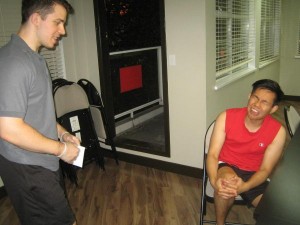Knee pain is a common complaint of all people from different ages. It is in fact one of the most common type of arthralgia (joint pain).Knee pain is particular on the knee joint or surrounding the knee joint. It often occurs as a result of injury, disease or overuse. Knee pain may begin as a mild discomfort that can gradually progress to excruciating pain. Obesity increases an individual’s risk for developing knee problems. Minor knee pain respond well to home care management, but for severe cases, physical surgery and some cases may require surgery.
Causes of Knee Pain
There is a wide variety of what can cause knee pain, mainly injuries, medical conditions and overuse. The following may lead to knee pain:
- Injuries
- Knee fracture
- Knee dislocation
- Muscle sprains and strains
- Bone chips
- ACL injury
- MCL injury
- Torn meniscus
- Patellar tendinitis
- Knee bursitis
- Medical conditions
- Arthritis: osteoarthritis, rheumatoid arthritis, gout, pseudogout, etc.
- Baker’s cyst
- Lupus
- Osgood-Schlatter disease
- Iliotibial band syndrome
- Knee infection (rare)
- Bone tumours (rare)
Accompanying Symptoms of Knee Pain
If any of the symptoms accompany knee pain, it may be time to seek medical treatment.
- Deep knee pain
- Pain that worsens with movement or when pressure is added on the knee, such as weight when walking
- Knee stiffness and swelling
- Knee weakness
- Fever and chills
- Extreme heat and warmth over the joint to touch
- Popping or crunching noises
- Inability to completely straighten the knee
First Aid Management of Knee Pain
Simple causes of knee pain may disappear on its own with sufficient home care. However, in more complicated causes, medical treatment may be necessary to treat the underlying cause. For simple causes, the following steps are generally advised to relieve of knee pain:
- For cases of sprains and broken bones, follow the RICE method.
- Rest the affected knee and avoid doing any more activities that may worsen the pain.
- Ice the affected area for 15-20 minutes at least four times a day. Wrap the ice in a towel or any cloth.
- Compress the affected knee using a compression bandage to limit swelling.
- Elevate the affected while sitting or lying down, also to limit swelling.
- In cases of fractures and dislocations, it is extra important to immobilize the joint.
- Take over-the-counter pain and anti-inflammatory medications such as ibuprofen and aspirin. However, do not give aspirin to children younger than 19 years of age.
Prevention of Knee Pain

It is not always possible to avoid knee pain such as in cases of medical conditions. Fortunately, there are ways to prevent knee pain with regard to other causes. These tips do not guarantee complete prevention, but may help decrease chances of developing knee pain:
- If one is obese, lose the extra pounds. It is necessary to sustain a healthy weight.
- Exercise regularly and strengthen the muscles. This will not only avoid knee pain but other bone and muscular pains.
- Always warm up before exercising and cool down afterward.
- If one has chronic knee pain, the doctor may prescribe exercises such as swimming, water aerobics and other low-impact activities.
Disclaimer: This article does not provide medical advice or treatment. This information given should not be used for self-diagnosis of the possible conditions. Seek medical attention when needed. To learn more about how to manage knee pain and other body pains, enrol in First Aid Courses with St Mark James training.
